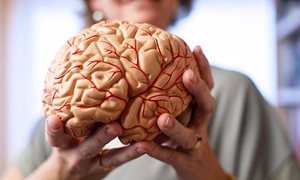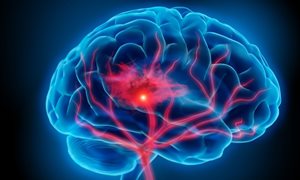 In the early nineteen eighties, seven young Americans developed severe and acute symptoms of Parkinson’s disease shortly after injecting themselves with a new synthetic heroine. This incident has dramatically changed the way we think about the cause and treatment of Parkinson’s disease. Now, thirty years later, Jorik Nonnekes and Bas Bloem of Radboud university medical center have obtained the original video images of these patients. Based on this unique footage, they have made two interesting new observations that had not been noted in the original descriptions. They describe their observations in an article in the 15 March edition of The Lancet Neurology.
In the early nineteen eighties, seven young Americans developed severe and acute symptoms of Parkinson’s disease shortly after injecting themselves with a new synthetic heroine. This incident has dramatically changed the way we think about the cause and treatment of Parkinson’s disease. Now, thirty years later, Jorik Nonnekes and Bas Bloem of Radboud university medical center have obtained the original video images of these patients. Based on this unique footage, they have made two interesting new observations that had not been noted in the original descriptions. They describe their observations in an article in the 15 March edition of The Lancet Neurology.
Vintage video
In the nineteen eighties of the last century, Langston published a series of seminal articles on this MPTP-induced parkinsonism in high-impact journals such as Science. The discovery of MPTP-induced parkinsonism has had an enormous impact on our entire understanding of Parkinson’s disease. Langston collected video footage of these patients with MPTP-induced parkinsonism, but the videos were never published. Now, thirty years later, Bas Bloem and Jorik Nonnekes of Radboud university medical center publish these ‘vintage’ video images, together with Bill Langston. Careful review of these videos, in light of today’s knowledge, revealed two new observations that had remained unnoticed in the eighties.
Freezing of gait
One observation concerns freezing of gait, a disabling symptom that many Parkinson’s patients experience in advanced stages of the disease. During freezing of gait, patients have the feeling that their feet suddenly become glued to the floor. Jorik Nonnekes: “Surprisingly, freezing of gait was just not seen in the MPTP-patients, although you would expect this given their marked disease severity. However, we did see the classical picture of freezing of gait in one patient who had been treated with levodopa for several years. This may indicate that long-term use of levodopa plays a role in causing freezing.”
Large differences between patients
The researchers also discovered two subtypes of MPTP-induced parkinsonism in the footage. There is a relative mild subtype that is accompanied by pronounced tremors, and a more severe variant characterized mainly by stiffness and extreme slowness of movements. These subtypes are also seen in Parkinson’s patients. Bas Bloem, professor of Neurology at Radboud university medical center: “We still don’t understand properly why people with Parkinson’s disease differ so much from one another. It was a revelation for me to see such huge differences between people who had the exact same cause (MPTP) for their parkinsonism. The ability of healthy areas of the brain to compensate for MPTP damage might explain the presence of these subtypes. This ability to compensate varies considerably between different patients.’
Historical tribute
Bas Bloem: “The discovery of these seven patients in the early eighties was nothing less than a complete revolution in the world of Parkinson’s. Now, for the first time, we are showing the unique images of these patients to the medical world. They are really special from a historical perspective. And it is an extra bonus that review of these original images helped us to obtain new insights that can further support us in developing better treatments.”
How MPTP works
Parkinson’s disease is due to progressive loss of cells in the substantia nigra. MPTP (1-methyl-4-phenyl-1,2,3,6-tetrahydropyridine) is an organic compound that is highly toxic for nerve cells in the substantia nigra. This brain area produces the substance dopamine that is vital for controlling movement. The toxic effect of MPTP results in an acute depletion of dopamine, which then produces symptoms that are very similar to those of Parkinson’s disease, such as shaking (tremor) and slow movements.
-
Want to know more about these subjects? Click on the buttons below for more news.
Related news items

NWO Stevin Prize for expert on Parkinson’s disease Bas Bloem Major scientific prize for societal impact on research into Parkinson's disease
17 June 2022 Neurologist Bas Bloem of Radboudumc receives this year’s Stevin Prize of the Dutch Research Council (NWO). The Stevin Award is the highest distinction in science for a researcher in the Netherlands who has achieved particular success in the area of knowledge utilization for society. go to page
Aerobe exercise has a positive effect on brain function in Parkinson's disease patients
18 January 2022 Radboudumc researchers have shown that the brain function of patients with Parkinson's disease improved with regular exercise, which seems to strengthen the connections between different brain areas, while inhibiting brain shrinkage. go to page
Tiny blood vessels, big problems Radboudumc receives grant for international collaboration
3 November 2021 The Radboudumc, together with the University of Cambridge, receives a grant of €1.8M from three collaborating cardiac foundations for international research into the small blood vessels in the brain. This study will be led by Neurologist Frank-Erik de Leeuw and internist Niels Riksen. go to page
People with Parkinson’s disease can benefit from seven gait strategies
9 September 2021 People with Parkinson’s disease who have difficulty walking can use several strategies to improve walking. New research shows that many people have never heard of or tried these strategies. go to page
Treatment of brain diseases at risk if neuroscientists can no longer conduct their research
5 August 2021 In order to treat brain diseases such as depression, Alzheimer's or ADHD, more research into the brain is needed. go to page
